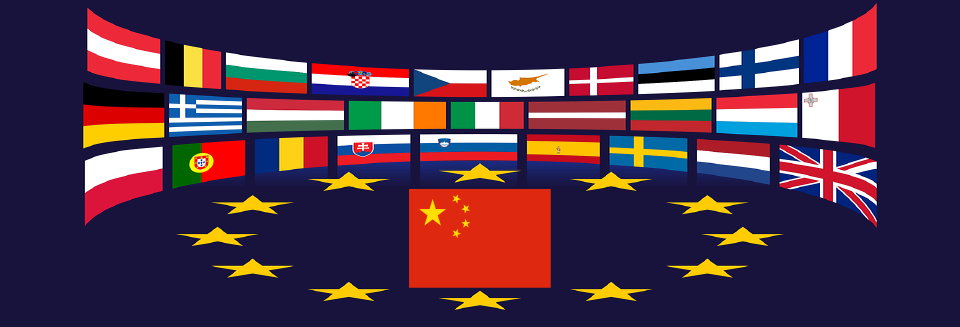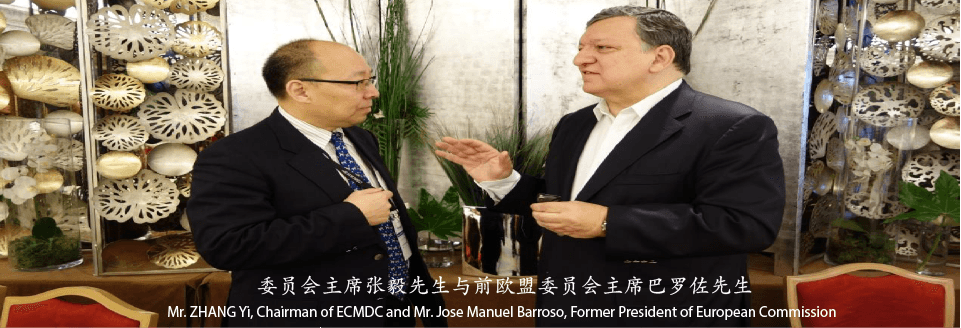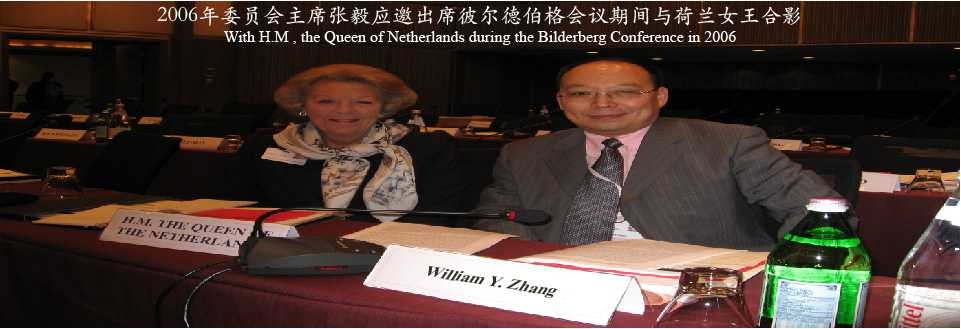《今日中国》(英文)刊发蔡润大使署名文章《做成就彼此、照亮世界的伙伴》
2025-05-08
在庆祝中欧建交50周年之际,《今日中国》(英文)杂志出版庆祝中欧建交50周年特刊,刊发中国驻欧盟使团团长蔡润大使署名文章《做成就彼此、照亮世界的伙伴》,以下是文章全文(中、英文):
今年是中国同欧盟建交50周年,是中欧关系承前启后、继往开来的重要节点。50年来,中欧关系经历国际风云变幻考验,保持稳定发展势头,既造福双方人民,也促进了世界和平稳定和发展繁荣。当前国际形势变乱交织,中欧关系更加具有战略意义和全球影响。一个健康稳定的中欧关系,不仅将成就彼此,还将照亮世界。
这是中欧关系水平持续提升的五十年。1975年,中欧老一辈领导人审时度势,以非凡的政治魄力冲破冷战隔阂,做出双方建交的决定。2001年中欧建立全面伙伴关系,2003年升级为全面战略伙伴关系。2014年,习近平主席历史性首次访问欧盟总部,提出建造中欧和平、增长、改革、文明四座桥梁,建设更具全球影响力的中欧全面战略伙伴关系。今年新年伊始,习近平主席同欧洲理事会主席科斯塔通电话,去年访欧时同法国总统马克龙、欧委会主席冯德莱恩举行了三方会晤,习主席同欧方领导人深入交流,就中欧关系发展达成重要共识,为双方关系发展指明了方向,提供了战略引领。中欧领导人会晤机制自1998年启动以来已举行24次会晤;双方还建立了战略、经贸、数字、环境与气候、人文五大高级别对话和70多个对话机制,为推动中欧关系发展发挥了重要作用。
这是中欧务实合作蓬勃发展的五十年。中欧互为主要贸易伙伴和投资对象,双方年度贸易额从建交时的24亿美元增长到2024年的7858亿美元,相互投资存量从几乎为零增长到近2600亿美元。中欧班列累计开行超过10万列,通达欧洲25个国家227个城市,成为连接亚欧的黄金通道。中欧地理标志协定已完成第二批各175个地标产品清单公示,越来越多优质产品进入双方市场,走上百姓餐桌。双方在财政、金融、交通、海关、水利、新闻出版、卫生、司法等领域的合作富有成效,在数字经济、新能源、人工智能等新兴领域合作稳步推进。中欧人文交流日益密切,双方共同举办中欧文化年、旅游年,中国单方面免签政策已惠及24个欧盟成员国。熊猫、哪吒、《黑神话:悟空》……越来越多的中国文化元素走进欧洲民众视野,在双方人民之间架起心与心的沟通桥梁。
这是中欧携手为世界和平与发展作出积极贡献的五十年。中欧是推动多极化的两大力量,支持全球化的两大市场,倡导多样性的两大文明。中欧都坚持多边主义,在联合国、二十国集团等多边平台开展合作,就乌克兰危机、巴以冲突、伊朗核问题等热点保持沟通。中欧都支持自由贸易,都主张维护以世贸组织为核心的多边贸易体制,致力于推进世贸组织改革。中欧都抱持天下情怀,携手推动《巴黎协定》的达成和落实,在气候变化、人工智能等事关人类未来的重大问题上保持沟通协调,增进全人类福祉。
回顾历史,中欧关系并非总是一帆风顺,也曾经历风风雨雨,双方关系能够风雨过后见彩虹,关键是尊重各自人民选择的社会制度和发展道路,尊重彼此核心利益和重大关切。以史为鉴,才能更好走向未来。中欧关系50年发展历程带给我们四点重要启示:
最宝贵的经验是相互尊重。中华民族“和而不同”“美美与共”的传统思想与欧盟“多元一体”的发展理念不谋而合。中欧社会制度、意识形态、历史文化、发展水平不同,这些差异应是双方交流合作的动力,而不应成为对立对抗的理由或借口。中欧关系50年发展历程表明,只要双方相互尊重、平等相待、坦诚对话,就能推动合作、办成大事。
最强大的动力是互利共赢。中国改革开放进程与欧洲一体化同频共振。经过50年的持续合作,中欧早已形成你中有我、我中有你的共生局面。中欧务实合作从无到有、由小到大,从工业制造拓展到新兴科技,从传统贸易发展至联合制造,靠的是优势互补的内生驱动和互利共赢带来的获得感。坚持优势互补、互利共赢,坚持通过对话协商妥善解决经贸分歧摩擦,反对将经贸问题政治化、泛安全化,中欧务实合作将展现更加广阔的发展前景。
最一致的共识是多边主义。中欧都是二战后国际秩序的缔造者和受益者,也是经济全球化和世界多极化的推动者和维护者。中方始终认为欧洲是多极世界中的重要一极,支持欧洲一体化和欧盟战略自主。从走出冷战阴霾到维护联合国权威,从推动实现可持续发展目标到通过《未来契约》,从应对气候变化到抗击新冠疫情,无论国际形势如何变化,中欧始终坚定选择多边主义,在全球治理中共同发挥引领作用,推动国际秩序朝着更加公正合理的方向发展,为世界和平与发展不断作出中欧贡献。
最准确的定位是合作伙伴。中欧分处亚欧大陆两端,中欧之间不存在根本利害冲突,也没有地缘政治矛盾,共识远大于分歧,合作远大于竞争,是相互成就的伙伴而非零和博弈的对手,更不是敌人。中欧关系的发展历程表明,只要坚持做伙伴,就总能找到解决问题的办法。国际形势越是严峻复杂,中欧越要秉持建交初心,加强战略沟通,增进战略互信,坚持伙伴关系定位。
当前,世界面临百年未有之大变局,面对变乱交织的世界,中欧双方应从自身根本利益和世界前途命运出发,做出符合历史潮流的正确选择。中国对欧盟抱有信心,真诚希望欧盟也能成为中方可以信任的合作伙伴。我们真诚希望中欧双方携手努力,推动中欧全面战略伙伴关系行稳致远。
中欧要做对话合作的先行者。双方要以建交50周年为契机,进一步加强高层往来,进一步深化各领域交流合作,共同办好庆祝建交50周年系列活动,以建设性沟通增信释疑、改善相互认知,把握好机遇,应对好挑战。
中欧要做开放发展的倡导者。开放是中国式现代化的鲜明标识。中国坚定致力于进一步扩大高水平对外开放,向世界发出共享机遇、共同发展的真诚邀约。与中国同行就是与机遇同行,投资中国就是投资未来。作为开放型世界经济的受益者,我们没有理由让“去风险”变成“去机遇”、变成“去合作”。中欧应保持双向开放、维护产供链稳定,进一步发掘绿色、数字、科技、金融等领域合作潜力。中国欢迎欧洲继续搭乘中国发展的快车,在共同发展繁荣的道路上并肩而行。
中欧要做多边主义的践行者。今年是世界反法西斯战争胜利80周年,也是联合国成立80周年。中欧应坚持真正的多边主义,推动共商共建共享的全球治理,共同致力于在以联合国为中心的多边框架内推动政治解决热点问题,携手应对气候变化、人工智能等全人类共同挑战,共同维护世界和平稳定、促进国际公平正义。面对全球发展赤字,中欧可推动“一带一路”倡议和“全球门户”计划对接,为实现联合国可持续发展目标作出积极贡献。
中欧要做文明互鉴的推动者。习近平主席提出全球文明倡议,呼吁各方以文明交流超越文明隔阂、文明互鉴超越文明冲突、文明包容超越文明优越。中方愿同欧方以开放包容的态度开展交流对话,在互学互鉴中共同进步、共同发展。中方将进一步扩大免签国家范围,落实“3年1万,欧洲翻番”等倡议,同时我们也期待欧方与中方相向而行,进一步便利双方人员往来。中方愿同欧方共同努力,不断夯实中欧友好的民意基础,拉紧友谊纽带,为中欧关系发展提供不竭动力。
潮平两岸阔,风正一帆悬。站在中欧关系新的起点上,我们相信中欧双方有能力也有智慧共同开辟中欧关系更加美好的明天,共同开辟下一个值得期待的50年。
China-EU Partnership: Mutual Uplift for a Brighter World – Celebrating the 50th Anniversary of Diplomatic Ties This year marks the 50th anniversary of the establishment of diplomatic relations between China and the European Union (EU), a pivotal milestone that bridges the past and future of China-EU relations. Over the past five decades, China-EU ties have withstood the test of shifting global dynamics, and maintained stable development momentum that has not only brought mutual benefits to our peoples, but also contributed to world peace, stability, development, and prosperity. Amidst today’s turbulent international landscape, China-EU relations carry heightened strategic significance and global implications. A sound and stable partnership between China and the EU will not only propel shared development, but also illuminate a path for the world. The past half-century has witnessed the continuous elevation of China-EU relations. In 1975, visionary leaders from both sides, assessing the global situation with extraordinary political courage, broke through Cold War barriers and established diplomatic ties between the two sides. A new chapter opened in 2001 with the establishment of the China-EU comprehensive partnership, which was upgraded to a comprehensive strategic partnership in 2003. The relationship reached another milestone in 2014 when President Xi Jinping made his historic first visit to EU headquarters. During the visit, President Xi proposed to build four bridges for peace, growth, reform and progress of civilization to forge a China-EU comprehensive strategic partnership with greater global influence. Strategic coordination between the two sides has intensified. In early 2025, President Xi held a phone conversation with European Council President António Costa. During his European tour last year, President Xi had a trilateral meeting with French President Emmanuel Macron and European Commission President Ursula von der Leyen. These high-level exchanges yielded crucial consensus on charting the course for China-EU relations and provided strategic guidance for future development. Since its inception in 1998, the China-EU Summit mechanism has convened 24 meetings. The two sides have established five high-level dialogues discussing issues covering strategy, economy and trade, digital development, environment and climate, as well as people-to-people exchanges. There are also over 70 specialized dialogue mechanisms. These multi-tiered dialogue mechanisms have proven instrumental in advancing practical cooperation across all domains. The past half-century has witnessed vigorous growth of China-EU pragmatic cooperation. As each other’s major trading partner and investment destination, China and the EU have seen their trade volume surge from US $2.4 billion at the time when the two sides first established diplomatic ties to US $785.8 billion in 2024, while two-way investment in stock has risen from nearly zero to approximately US $260 billion. The China-Europe Railway Express, operating over 100,000 freight train trips connecting 227 cities across 25 European countries, has become an artery connecting Asia and Europe. Practical cooperation continues deepening China-EU ties across sectors. The implementation of the China-EU Geographical Indications Agreement has seen the second batch of products, 175 products respectively from each side protected by the program, bringing more premium goods to both markets and to ordinary people’s dinner tables. Fruitful collaboration extends to finance and taxation, customs, transportation, water resources, press and publishing, healthcare, and judicial affairs. Steady progress has been made in emerging fields, like the digital economy, new energy, and artificial intelligence. People-to-people bonds grow ever stronger. Joint initiatives, such as the China-EU Culture Year and Tourism Year events, have flourished. China has launched unilateral visa-free policy covering 24 EU member states. From giant pandas and the Chinese animated blockbuster Ne Zha to the video game sensation Black Myth: Wukong, Chinese culture is increasingly captivating European audiences, forging heart-to-heart connections between people on both sides. The past five-decade journey has witnessed China and Europe’s shared contribution to global peace and development. China and Europe are two major forces in building a multipolar world, two big markets that promote globalization, and two great civilizations that advocate cultural diversity. China and Europe have forged a partnership to shoulder global responsibility. Both sides champion multilateralism, coordinating closely at the UN, G20, and other international platforms, while maintaining constructive dialogues on hotspot issues, including the Ukraine crisis, Palestinian-Israeli conflict, and Iran nuclear issue. Both China and the EU support free trade, advocate for the maintenance of the multilateral trading system centered on the World Trade Organization, and are committed to promoting WTO reforms. Both hold a global vision, work together to promote the adoption and implementation of the Paris Agreement, maintain communication and coordination on major issues related to the future of humanity, such as climate change and artificial intelligence, and enhance the well-being of all humankind. The history of the China-EU relationship shows the partnership has not always been smooth sailing. The key to maintaining the relationship lies in respecting each other’s social system and development path chosen by their respective peoples, as well as to respect each other’s core interests and major concerns. Using history as a mirror enables us to better navigate the future. The 50-year development of China-EU relations enables people to reach four conclusions. First, mutual respect is the most precious experience for developing diplomatic relations. China’s traditional idea of “harmony in diversity” coincides with the EU's motto of “united in diversity.” Differences in social systems, ideologies, historical traditions, cultures, and developmental levels between China and the EU should serve as a driving force for communication and cooperation, rather than excuses or reasons for confrontation. The 50-year development history of China-EU relations demonstrates that as long as both sides respect each other, treat each other as equals, and engage in honest dialogue, cooperation can be promoted and tasks can be finished. Second, mutually beneficial and win-win cooperation is the most powerful impetus of China-EU relations. China’s reform and opening-up has been advancing in tandem with European integration. After 50 years of continuous cooperation, the two sides have been closely intertwined economically. Starting from scratch, pragmatic cooperation between the two sides has expanded from industrial manufacturing to emerging technologies, and from traditional trade to joint manufacturing. The two sides complement each other in terms of edges in economic development and their economic cooperation is mutually beneficial. Carrying on such win-win cooperation, resolving economic and trade differences and frictions through dialogue and consultation, and opposing the politicization of economic and trade issues, the two sides will embrace an even brighter future in their relations. Third, multilateralism is the greatest consensus benefiting long-term relations between the two sides. China and Europe are creators and beneficiaries of the postwar international order, as well as champions for economic globalization and a multi-polar world. China has always taken Europe as an important pole in a multi-polar world and supported European integration and the EU’s strategic autonomy. From stepping out of the shadow of the Cold War to upholding the UN’s authority in international affairs, from addressing climate change to combating the COVID-19 pandemic, China and the EU have consistently chosen multilateralism and played a leading role in global governance regardless of how the international situation changes. The two sides have been working to move the international order toward a more just and reasonable direction, continuously contributing to world peace and development. Fourth, cooperation partnership is the most accurate positioning. Located at the two ends of the Eurasian continent, China and Europe have neither conflicting fundamental interests nor geopolitical contradictions. Their consensus far exceeds their differences, and cooperation surpasses competition. They are mutually beneficial partners rather than rivals in a zero-sum game, and certainly not enemies. The historical development of China-EU relations indicates that as long as they maintain their partnership, solutions to problems can always be found. As the international situation becomes increasingly severe and complex, China and the EU must adhere to their original intention in developing diplomatic relations, strengthen strategic communication, enhance strategic mutual trust, and uphold the positioning of partnership. Currently, the world is undergoing unprecedented changes unseen in a century. In light of a complicating global landscape, both China and the EU should make correct choices and go with the historical trends based on their fundamental interests and for the future of the world. China has confidence in the EU and sincerely hopes that the EU can also become a trustworthy partner for China. The Chinese side sincerely hopes that joint efforts can be made to promote steady and long-term development of the China-EU comprehensive strategic partnership. For this purpose, efforts can be made in the following aspects. China and the EU should act as pioneers for dialogue and cooperation. The two sides should take the 50th anniversary of bilateral diplomatic relations as an opportunity to further strengthen high-level exchanges, deepen cooperation in various fields, ensure the success of the celebration events marking the 50th anniversary, enhance mutual trust, dispel suspicions and improve understanding toward each other through constructive communication. It is of great significance for the two sides to seize opportunities and address challenges. China and the EU should work together to advocate openness and development. Opening up is a defining feature of Chinese modernization. China will make unremitting efforts to expand higher-level opening up, and stay committed to sharing development opportunities with all countries. Embracing China is embracing opportunities, and investing in China is investing in the future. As the beneficiary of an open world economy, we have no reason to let de-risking deprive us from opportunities and cooperation. Rather, they should remain open to each other, maintain the stability of industrial and supply chains, and further tap cooperation potential in green energy, the digital economy, science and technology, finance and other fields. China welcomes the EU to board the express train of China’s economic growth, and work with China to achieve common development and prosperity. China and the EU should work together to practice multilateralism.This year marks the 80th anniversary of the victory of the World Anti-Fascist War and the founding of the United Nations. China and the EU need to practice true multilateralism, improve global governance based on extensive consultation, joint contribution and shared benefit, and promote political settlement of hotspot issues within the UN-centered multilateral framework. The two sides should work jointly to address the challenges for all of humanity, such as climate change, AI, and other issues, and safeguard world peace and international justice. In the face of the global development gap, China and the EU should promote greater synergy between the Belt and Road Initiative and the EU’s Global Gateway strategy, so as to make progress in realizing the UN’s sustainable development goals. China and the EU should work together to facilitate mutual learning between civilizations. Chinese President Xi Jinping proposed the Global Civilization Initiative that calls on all parties to let cultural exchanges transcend estrangement, mutual learning transcend clashes, and coexistence transcend feelings of superiority. China is ready to work with the EU to conduct exchanges and dialogue with an open and inclusive attitude, and advance common development through mutual learning. China will include more countries in its visa free policy, and implement the initiative of increasing the number of French students studying in China to more than 10,000, and doubling the number of young Europeans attending exchange programs in China in three years. At the same time, China hopes to work with the EU and develop toward the same direction by further facilitating personnel exchanges between the two sides. China is willing to join hands with Europe to cement public support and strengthen the bond of friendship between the peoples to inject continuous impetus to China-EU relations. As an ancient Chinese poem goes, “With high tide and tailwind, it is time to sail a smooth ride.” At this new starting point, the two sides have the capacity and wisdom to jointly usher in a brighter future and another promising 50 years for China-EU relations.
相关链接:中国驻欧盟使团





